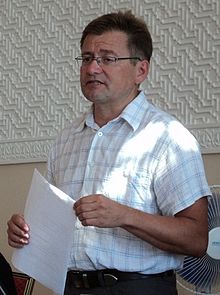Loading AI tools
Professor of international history From Wikipedia, the free encyclopedia
Vladislav Martinovich Zubok (Владислав Мартинович Зубок; born 16 April 1958) is professor of international history at the London School of Economics and a Head of the Сold War Studies Programme in the Department of International History. Zubok is a specialist in the history of the Cold War and 20th century Russia, who wrote such books as A Failed Empire: the Soviet Union in the Cold War from Stalin to Gorbachev (2007) and Zhivago’s Children: the Last Russian Intelligentsia (2009).[1]
Vladislav M. Zubok | |
|---|---|
Владислав М. Зубок | |
 | |
| Born | April 16, 1958 Moscow, USSR |
| Academic background | |
| Alma mater | Moscow State University, Institute for US and Canadian Studies |
| Academic work | |
| Discipline | History |
| Sub-discipline | Cold War |
| Institutions | National Security Archive, Amherst College, Ohio University, Stanford University, University of Michigan, Temple University, Foreign Policy Research Institute, London School of Economics |
He was born and educated in Moscow. He received his undergraduate degree at Moscow State University in 1980, and his PhD at the Institute for the US and Canada in 1985.[2]
Zubok became a fellow at the National Security Archive, a non-government organization at the George Washington University from 1994 till 2001. He has been a visiting professor at Amherst College, Ohio University, Stanford University, and the University of Michigan, and in 2004 he became a tenured professor at Temple University.[1]
He also was a director of the Russian and East European Document Database Project of the National Security Archive, George Washington University and Cold War International History Project, Woodrow Wilson International Center for Scholars, Washington D.C., funded by Smith Richardson Foundation, where he created an English language catalogue of newly available documentation from 1996 till 2001.[3]
Zubok is a senior fellow of The Hertog Program in Grand Strategy at the Foreign Policy Research Institute.[4]
For his books he received the Lionel Gelber Prize and the Marshall Shulman Prize of the Association for Slavic, East European, and Eurasian Studies.
He has also received grants from the MacArthur Foundation, Carnegie Corporation of New York, the Yeltsin Center and the Russkiy Mir Foundation.[2]
He was a consultant on documentary series such as CNN's twenty-four part series Cold War first broadcast in 1998.
Seamless Wikipedia browsing. On steroids.
Every time you click a link to Wikipedia, Wiktionary or Wikiquote in your browser's search results, it will show the modern Wikiwand interface.
Wikiwand extension is a five stars, simple, with minimum permission required to keep your browsing private, safe and transparent.